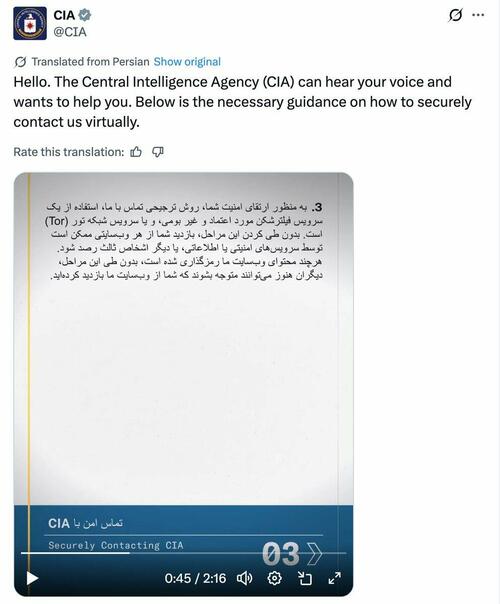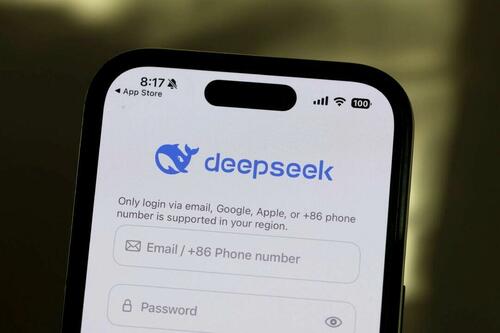CIA Tells Iranians: 'We Want To Help You' - As US Bombers Loom
The US Central Intelligence Agency has never been shy about letting it be known it is seeking to recruit informants from places like China, North Korea and Iran.
The agency has in the recent past released messages in Mandarin, Korean, and Farsi. As a CIA spokesman once said during a prior recruitment effort, "We want to make sure individuals in other authoritarian regimes know that we're open for business."
On Tuesday the CIA issued a special message once again for Iranians in particular, but now the timing is more interesting, given the Trump administration stands on the precipice of deciding on pursuing war or diplomacy with Tehran. He's also gearing up to give his State of the Union Address, and Iran will be high on the agenda.
The CIA posted to X, Instagram, and other officially verified platforms a video in Farsi which encourages Iranians to contact the agency, while featuring instructions for using Tor and other encrypted methods to ensure anonymity, and so local Iranian authorities can't uncover the communications.
The CIA in the message while addressing Iranians in the context of the recent anti-government protests stressed the agency "can hear your voice" and "wants to help you".
According to some of the brief video details:
The video walks viewers through several steps that should be taken to ensure that any contact with the CIA from within Iran will be kept private and to ensure that the identity of the dissident cannot be found out.
It suggests that anyone wishing to contact the CIA should do so from a burner device and using the most up-to-date version of their internet browser of choice.
The person should also use the browser’s incognito mode and clear the browser and device history after making contact, it says.
It also strongly encourages anyone who contacts the agency from Iran to use Tor or a VPN to encrypt the communication, and provides instructions on how to use Tor, warning that without doing so, a visit to the CIA website will be visible to others.
Such outreach efforts, in search of potential future spies, isn't going to help relations between Iran and the US, given Iranian leaders are already on edge about the biggest Pentagon build-up in the region since the 2003 Iraq war.
Tehran has already accused the protesters of being in league with the US, Israel, and foreign intelligence. This fresh CIA recruitment effort is only going to fuel these suspicions and paranoia further.
Israel has all the while been even more boastful that it had agents "on the ground" during January's deadly unrest, which saw thousands of protesters killed, but also resulted a reported couple hundred police and security personnel killed.
Tyler Durden Tue, 02/24/2026 - 21:20


 The DeepSeek app on an iPhone screen in San Anselmo, Calif., on Jan. 27, 2025. Justin Sullivan/Getty Images
The DeepSeek app on an iPhone screen in San Anselmo, Calif., on Jan. 27, 2025. Justin Sullivan/Getty Images


Recent comments